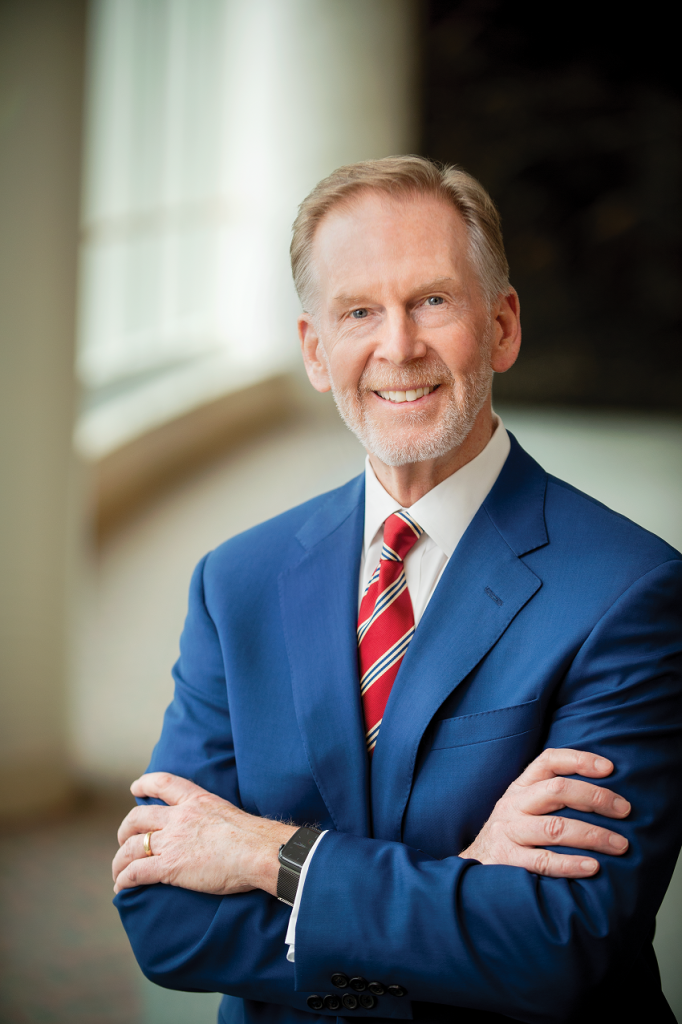Mayo Clinic CFO Dennis Dahlen preparing for his year as HFMA’s National Chair
Dahlen is expected to draw on his experience to help forge solutions during a daunting time for the healthcare industry.

After several decades spent making an impact at the healthcare organizational level, Dennis Dahlen is moving into a prime position to use his expertise for the benefit of stakeholders across the industry. The opportunity could not come at a more important juncture.
The urgency is reflected in Dahlen’s theme for the new fiscal year, which he’ll spend serving as Chair of HFMA’s Board of Directors. His Chair theme, It’s time, is a call to action not only for HFMA and its members but also for the industry at large.
On that front, HFMA’s strategic focus on addressing the cost effectiveness of health (CEoH) provides a framework for needed changes, said Dahlen, the CFO of Mayo Clinic since 2017.
“We lag the developed world in results, health disparities, mortality,” he said, adding that the United States is “multiples above other developed nations in terms of what it costs us to get the results we have.”
Ongoing financial trends make the situation more pressing across the system. Dahlen, a healthcare finance professional for 40 years, said this is the first time he can recall seeing “historically strong players in the industry — large health systems of scale with strong market positions — struggle financially. I think that’s a canary-in-the-coal-mine moment.”
The need for HFMA to provide guidance and solutions has never been greater, he said.
Workforce issues
Among various factors that have contributed to the recent struggles of hospitals and other providers, workforce concerns are a key driver.
“We’re not as desirable relative to other options as we have been,” Dahlen said, citing increased hostility toward clinicians and the lingering stresses of the pandemic. “We’re losing the hearts and minds of a whole slice of the workforce that we used to be attractive to.”
Dennis Dahlen career highlights
Solutions may need to entail steps such as shortening the amount of time it takes to earn licensure as a registered nurse, he said. More fundamentally, the industry should learn to finally become more efficient.
“We’re bad at doing what every other industry does: When labor gets scarce or expensive, you use technology to replace it or to make it less scarce or less expensive,” he said. “Our history is we’ve grown almost in lockstep. If we grow 1%, we’ve increased our workforce by 1%.”

Role of innovation
There is plenty for the industry to build on, starting with continually remarkable progress in clinical science. In conjunction, Dahlen hopes to see upgrades in the application of technology such as artificial intelligence (AI).
Underpinning that effort, he said, should be improved utilization of data science in “accelerating medical discovery and then putting it into practice and validating it, making sure it’s absent any biases, so that you can actually create bots and AI that may be the secret ingredient, the trip wire, to [deploying] technology to replace human effort at some point.”
In some ways, legacy stakeholders may benefit from being “fast followers” of innovative practices developed by startups and disruptors, Dahlen said. But in areas such as business and payment models, they should strive to take the initiative.
“So often [in] the industry, we sit on our hands or at least wait for CMS to do something, to move us along the continuum,” he said. “And then of course, we complain about it. Let’s propose and innovate and implement the changes we think make sense rather than waiting for CMS.”
Initiatives for HFMA
Dahlen sees room for HFMA to increase the value of its services at a time when membership has exceeded 100,000 on the strength of the Enterprise Solutions program.
After a couple of years in which the Association has made CEoH its just cause, Dahlen thinks the focus on that concept should move to the next stage.
“We haven’t really stepped into those shoes,” he said. “We’ve been thinking about how we step into those shoes. We’ve got to explore new offerings to our members, to our Enterprise sponsor organizations as well.”
A coveted opportunity: Helping to lead Mayo Clinic
Board members are looking at how to make HFMA “a solution provider,” Dahlen said. Possibilities include establishing benchmarks and curating tools around CEoH or even partnering with an academic organization to create a CEoH-focused institute — “and we start really being that thought leader,” he said.
HFMA also should consider how to serve early careerists who may seek different features from a professional association than members of Dahlen’s generation did as young employees.
“They’re probably less inclined to go to in-person events,” he said. “They’re probably more inclined to do online training and be perfectly happy with that. They like a self-service model. And so, [it’s about] keeping our offerings fresh in terms of the delivery and the modes that we sponsor.”
A period of transition
Part of Dahlen’s It’s time call to action involves taking a pause to reflect on HFMA’s history as a trusted authority for more than 75 years and on the record of accomplishment of President and CEO Joseph J. Fifer, who was set to retire after 11 years in June.
During an interview conducted near the end of a process in which Ann Jordan was selected to succeed Fifer, Dahlen ruminated on the opportunity presented by the change in leadership.
“I couldn’t be more grateful and proud of what we’ve accomplished under Joe’s tenure as CEO,” Dahlen said. “We’ve just made terrific progress in terms of building the chassis for an association built for the future.
“That said, we’d love for Joe’s ceiling to be the floor for the next CEO. Every leader has new ideas and new ways of thinking about things. I’m pretty enthusiastic about taking it to the next level [to] really drive that value proposition for our members, for the industry, for policymakers and ultimately for our citizens.”
Busy year ahead
Dahlen is excited to experience HFMA events in many parts of the country over the next year. He may not travel to every chapter, as some National Chairs have, because he wants to maintain his position at Mayo Clinic.
“So much of HFMA’s energy happens at chapter meetings, regional meetings, out of the national spotlight,” he said. “I’m just looking forward to seeing the variety and meeting a whole bunch of new people that I could add to my network, and maybe a few new friends.”
As he prepared to move into the lead role, Dahlen thought back to his early HFMA Annual Conferences, where he’d observe current and previous Chairs.
“They were these individuals [who] were highly regarded, highly respected,” Dahlen said. “It was never in my wildest dreams that I would one day be that person for a year. So, it’s a little bit of a pinch-me moment.”
Dennis Dahlen career highlights
2017-PRESENT
Mayo Clinic, Rochester, Minnesota (CFO)
HFMA Board member (as Treasurer; Secretary/Treasurer; Chair-Elect; and Chair)
1999-2017
Banner Health System, Phoenix (various positions, including senior vice president and CFO, 2009-17)
1983-1999
Lutheran Health System, Fargo, North Dakota (various positions, including director of finance, operations)
EDUCATION
MBA, Minnesota State University, Moorhead
BS, Accounting, University of North Dakota
FHFMA and CPA certification
Praise from friends and peers
In four decades of working in healthcare finance and participating in HFMA, Dennis Dahlen has formed an extensive network. Here’s how a few of his closest professional contacts described him leading up to the start of his tenure as HFMA National Chair.
“Dennis is a highly regarded healthcare finance and strategy expert who brings cutting-edge thinking to HFMA governance. He is both a stabilizing influence and a leader who inspires people to embrace change. That combination is invaluable during this dynamic period in healthcare finance.”
Joseph J. Fifer
Outgoing president and CEO
HFMA
“When he talks, he has something to say. It’s done in a respectful way, and it’s something that generally needs to be said and adds value to the conversation. But he doesn’t have to have an opinion on everything, and that’s a good thing. And I think in [the National Chair] role, that will serve him well. He may often be the smartest guy in the room, but he doesn’t act like he’s the smartest guy.”
Bert Zimmerli
Retired executive vice president and CFO
Intermountain Healthcare
“He’s somebody you can always talk to. He demands performance, but he’s not the type of individual who’s going to bite your head off in any way, shape or form. He’s one of the most collaborative individuals I’ve ever met in the financial world. Sometimes, CFOs have a reputation for being a little less than that, but I think collaboration is one of his super skills, [as is] getting the most out of his people.”
David Ertel
CFO
Vizient
“He’s incredibly thoughtful, a very positive person. He develops people, he really looks at the team that he has and [considers] how he gets the most from them, but also how does he change that team structure to get the most for the organization? At Mayo, I know he reorganized, restructured and brought in different people with different skill sets. But the thing that stands out to me is he’s a gentleman in all respects.”
Kevin Roberts
Executive vice president and CFO
Geisinger
A coveted opportunity: Helping to lead Mayo Clinic
Working in the C-suite at one of the premier brands in healthcare “has been nothing short of amazing,” said Dennis Dahlen, who joined Mayo Clinic as CFO in 2017. He likened it to being a classical musician and getting invited to perform with the New York Philharmonic Orchestra.
“On a day-to-day basis, I have the honor and privilege of rubbing elbows with the world’s greatest expert in some thing or another,” he said. “I’m constantly surrounded by brilliance. Stories abound, and it really happens every day here, of the wandering patient who has been six or 12 places [before Mayo] and not had anybody [be able to help] in terms of, ‘What’s the matter with me?’ We can usually figure it out. The diagnostics here are absolutely first-rate.”
At the same time, a noticeable humility pervades the organization.
“They come to work every day, and they work tremendous amounts of hours on personal time just to advance medical science, train the next generation, take care of that extra patient, take a phone call or a video consult from across the world,” Dahlen said.
Other organizations have team-oriented cultures, he said, but few apply the concept as thoroughly.
“It comes from the way we recruit, the way we retain, the way we compensate,” Dahlen said. “Everybody gets the same raise every year.”
Conversely, “If you’re an alpha physician, if you want to be the star, this isn’t the place you want to practice because you’re just not going to be fulfilled. The patient’s needs are the only needs to be considered.”
Mayo Clinic has resources that other organizations lack, but Dahlen thinks some of the core tenets can be applied elsewhere in the industry. For example, other systems should consider using the physician-led governance model for which Mayo is known.
“I think it’s a superior model,” he said. “First of all, [physicians] know how the patient care model works, and they’re working on it every day.”
Mayo’s practice of rotating administrative and clinical leaders out of their positions every six to 10 years — while finding them other roles to take on in the organization — also is advantageous.
“Particularly in nonprofit health, we tend to get a lot of long-tenured individuals in the same roles, doing the same thing over and over again,” Dahlen said. “And it’s just human nature that you do sort of run out of ideas.”
5 things about Dennis Dahlen

1. A long and storied history. Dahlen has been an HFMA member since around 1985, when he was a couple of years into his healthcare finance career at Lutheran Health System in his home state of North Dakota.
“One of the pieces of advice I got from more than one individual that I respected was, ‘Join HFMA. It’s a great place to network. It’s education, training. It’s an opportunity to take on leadership roles.’ All [the things] that we tell ourselves about HFMA that are good. And I found all of them,” Dahlen said.
His experience with chapter leadership gave him exposure to HFMA’s national organization. Ultimately, his track record with the Association and in the industry got him appointed to HFMA’s Board of Directors in 2017.
2. A good place to start. Lutheran Health, where Dahlen worked for the first 16 years of his career, including as director of finance, was “just a great learning experience. I was blessed by a couple of really strong mentors in that space who saw some promise in me and brought me along and put me in places where I had no business being. And I just learned by trial and error.”
3. Tested in many ways. Dahlen gained ample strategic perspective during his 18-year stint with Phoenix-based Banner Health, which was formed by the 1999 merger of Lutheran Health and Samaritan Health. His initial task was to help with the post-merger transition.
“We put in new tools and reporting systems, and accountability matrices and KPIs and all of that,” he said. “We learned how to bring two big organizations together into a highly successful new organization.”
In 2015, a merger with the University of Arizona gave Dahlen exposure to “the challenges and difficulties of academic medicine. That was much harder than we ever imagined.”
He also learned firsthand about the interaction between insurance products and health system operations through a Medicare Advantage joint venture between Banner Health and the local Blues plan.
4. A sea change for CFOs. In four decades in the business, Dahlen has seen and experienced the evolution of the healthcare finance leader role. When he broke into the field, a CFO’s focus tended to be on capital markets, debt issues and profit-and-loss assessments.
Today, Dahlen’s set of responsibilities is broader than he could have imagined back then. The skills he brings to bear aren’t only those of a CPA or a seasoned finance pro. They also draw on his general strategic and business acumen.
“We’re looking out the windshield as opposed to the rearview,” he said. “It’s probably the state of healthcare today. The dynamism is so great that the variety of things I focus on in a given day is just immense.”
5. On the personal side. Dahlen’s family includes his wife of nearly 27 years, Mary, along with three children and five grandchildren. He’s an amateur musician and an avid golfer and runner.
He enjoys reading biographies, such as those on Presidents Grant, Lincoln and Washington, and other works of nonfiction. He recommends the book “Salt: A World History.”
A piece of advice that stands out was from early in his career, when his supervisor told him: “If you want to get ahead in the world, don’t bring me problems. Bring me solutions.”





